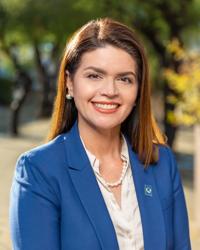In an effort to bring out different voices in the community during this difficult time, “The Point Being” podcast has focused on interviews with reporters, small business owners and other news makers. This week, we were joined by Regina Romero, the first woman to hold the mayor’s office in Tucson.
Our discussion focused mostly on the current COVID-19 crisis affecting Tucson, the state and the world. The conversation took place on Tuesday, April 28, it preceded the announcement by Gov. Doug Ducey to extend his stay-at-home order until May 15.
You can listen to this and other episodes in their entirety on our website, or at Apple Podcasts and Spotify.
This interview has been edited for clarity and length.
Question: Do you feel Gov. Ducey’s stay-at-home order should be extended past April 30?
Mayor Regina Romero: My emergency declaration also expires April 30, and I did that so I could stay in concert with the executive orders put out by Gov. Ducey. I wholeheartedly want to work with the governor on doing the right thing. I see the value in having a statewide directive.
But, I maintain that we should follow science and what the science is telling us, and what the CDC guidelines say regarding how to reopen the economy. I, just like everyone else, am very concerned about our economy. I know what this is doing to hurt small, locally owned businesses, and so I take that very serious.
At the same time, this virus is deadly and it’s killing Arizonans, it’s killing Tucsonans. And we have to use the guidelines that we have in front of us. Both the CDC and the Pima County Health Department put out really good criteria that will give us guidance on how to open.
Part of that criteria is the disease criteria: having 14 days of decreasing positive cases. Do we have 14 days of decreasing COVID-19 related deaths? Are we seeing a 14-day decrease in symptomatic cases? We haven’t.
Q: What has your communication with the governor and other officials been like?
Romero: One of the things that is concerning me a lot is that when the crisis first started, the governor’s office was reaching out to mayors across Arizona to give us information, to share knowledge and to get our feedback. And that was happening, every day for at least three weeks. Then most recently, he moved those daily meetings to twice a week.
Then starting last week, he stopped communicating with the mayors throughout Arizona. And that was a platform where the mayors would hear information as to what was happening, what plans they had. But they also gave us an opportunity to ask questions and to give input, and we haven’t been doing that in the past week and a half.
About four weeks ago, I started organizing a call with mayors here in Pima County. So the mayors of Oro Valley, Marana, South Tucson, Sahuarita and myself. We’ve invited Pima County, and we also have recently invited the chairman of the native nations, the Yaqui and the Tohono O’odham nation.
We can touch base, compare notes and get information from the Pima County Health Department. And so we’re doing that. But the Arizona-wide mayors calls with the governor are not happening.
Q: How do you communicate to people that may have lost or are in danger of losing their livelihoods the need for these measures?
Romero: What we’ve learned with this pandemic is that science is real and it’s important and that what scientists and epidemiologists throughout the world are telling us is that the physical distancing is what is controlling the spread from continuing to happen. And so for Tucson and Pima County residents that are concerned, I am concerned.
I’m very concerned about our economy, our locally owned, small businesses. I am very concerned about the livelihood of residents in Tucson. But what we also know is that this particular pandemic is hitting our economy hard. And if we don’t continue to control the spread, since we have no vaccine, it will continue hitting our economy.
And so if we relax, it’s a false hope. We don’t want our hospitals overwhelmed. Right now, we have enough ICU beds. The reason we have enough ICU beds and ventilators and hospital beds is because we have taken this stay home, physical distancing approach.
If we don’t continue using this tool, then the spread will continue into the fall and winter and our economy will continue to suffer. If we let loose too quickly, then that spread will continue, and we might have to make another call in the future, in the fall, in the winter, where we have to do this again with stay-at-home orders and start closing up things again.
And we don’t want to do that.



